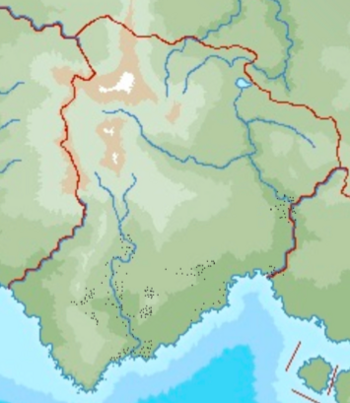Primitive Ruáian: Difference between revisions
Jump to navigation
Jump to search
 This Eurth-related article is a stub.
This Eurth-related article is a stub.
No edit summary |
No edit summary |
||
| (One intermediate revision by the same user not shown) | |||
| Line 4: | Line 4: | ||
{{Infobox language | {{Infobox language | ||
| name = Primitive Ruáian | | name = Primitive Ruáian | ||
| altname | | altname = Archaic Ruáian <br />Proto-Ruáianaigh | ||
| nativename = Ruáianaigh Ársa <br />Ruáianaigh Chianach | |||
| acceptance = | | acceptance = | ||
| image = Ogham_Stone.jpg | | image = Ogham_Stone.jpg | ||
| Line 28: | Line 29: | ||
| revived = | | revived = | ||
| revived-category = <!-- or revived-cat --> | | revived-category = <!-- or revived-cat --> | ||
| familycolor = Euro-Argisian | | familycolor = Indo-European | ||
| | | fam1 = {{wpl|Indo-European|Euro-Argisian}} | ||
| | | fam2 = [[Geltic Languages|Geltic]] | ||
| | | fam3 = [[Córthíac languages|Cordic]] | ||
| fam4 = [[Ruáianaigh]] | |||
| fam5 = |<!-- up to fam15 --> | | fam5 = |<!-- up to fam15 --> | ||
| protoname = | | protoname = | ||
Latest revision as of 20:07, 3 September 2024
This article is incomplete because it is pending further input from participants, or it is a work-in-progress by one author. Please comment on this article's talk page to share your input, comments and questions. Note: To contribute to this article, you may need to seek help from the author(s) of this page. |
| Primitive Ruáian | |
|---|---|
| Archaic Ruáian Proto-Ruáianaigh | |
| Ruáianaigh Ársa Ruáianaigh Chianach | |
 Gailír stone from Ratass Church, 6th century AD. It reads: [A]NM SILLANN MAQ VATTILLOGG ("[in the] name of Sílán son of Fáithloga") | |
| Region | Western Yeetlandia (Present Day Eastern Gotneska) |
| Ethnicity | Cordic |
| Era | Evolved into Old Ruáian about the 7th century AD |
Euro-Argisian
| |
| Gailír | |
| Language codes | |
| ISO 639-3 | – |
pru | |
 | |
Primitive Ruáian or Archaic Ruáian (Mealligian: Ruáianaigh Ársa, Ruáianaigh Chianach), also called Proto-Ruáianaigh, is the oldest known form of the Córthíac languages, and the ancestor of all languages within this family.
This phase of the language is known only from fragments, mostly personal names, inscribed on stone in the Gailír alphabet in Gotneska between the 3rd and 7th century AD, before the advent of Old Ruáian. These inscriptions are referred to as Orthodox Gailír, although scholastic use of the script continued residually until the early 19th century.